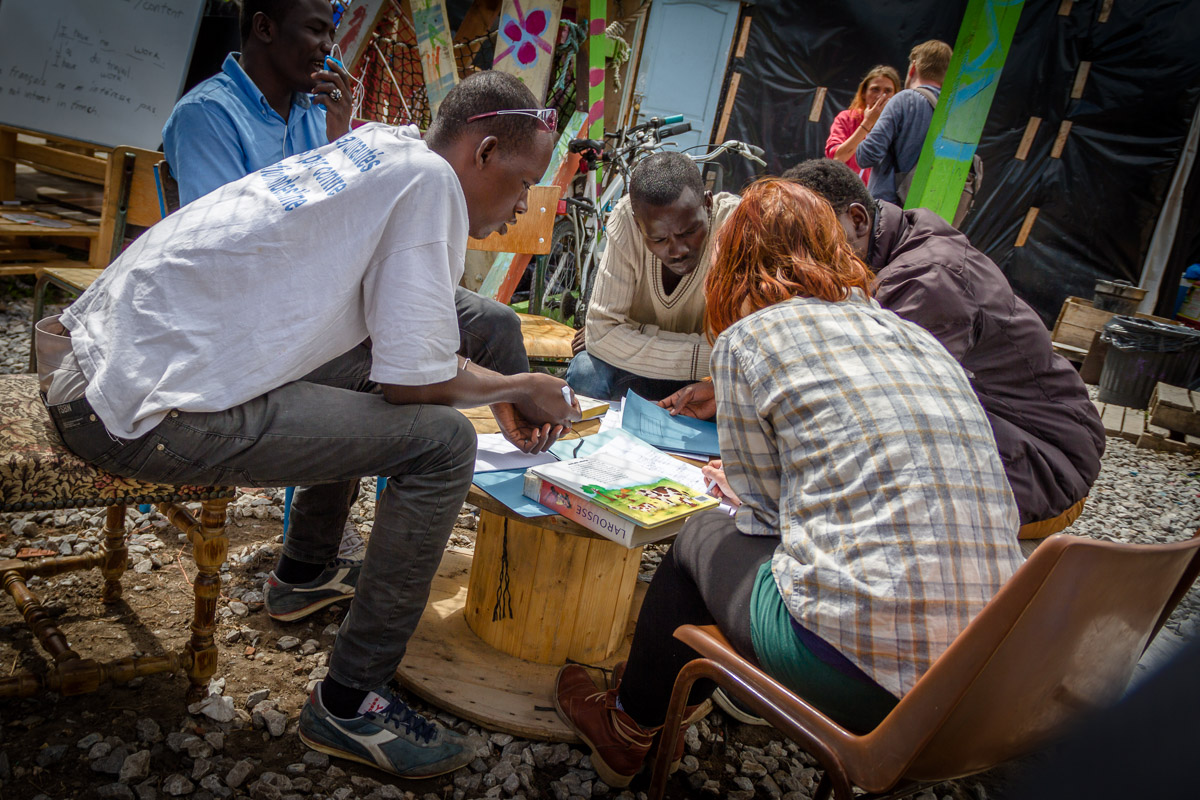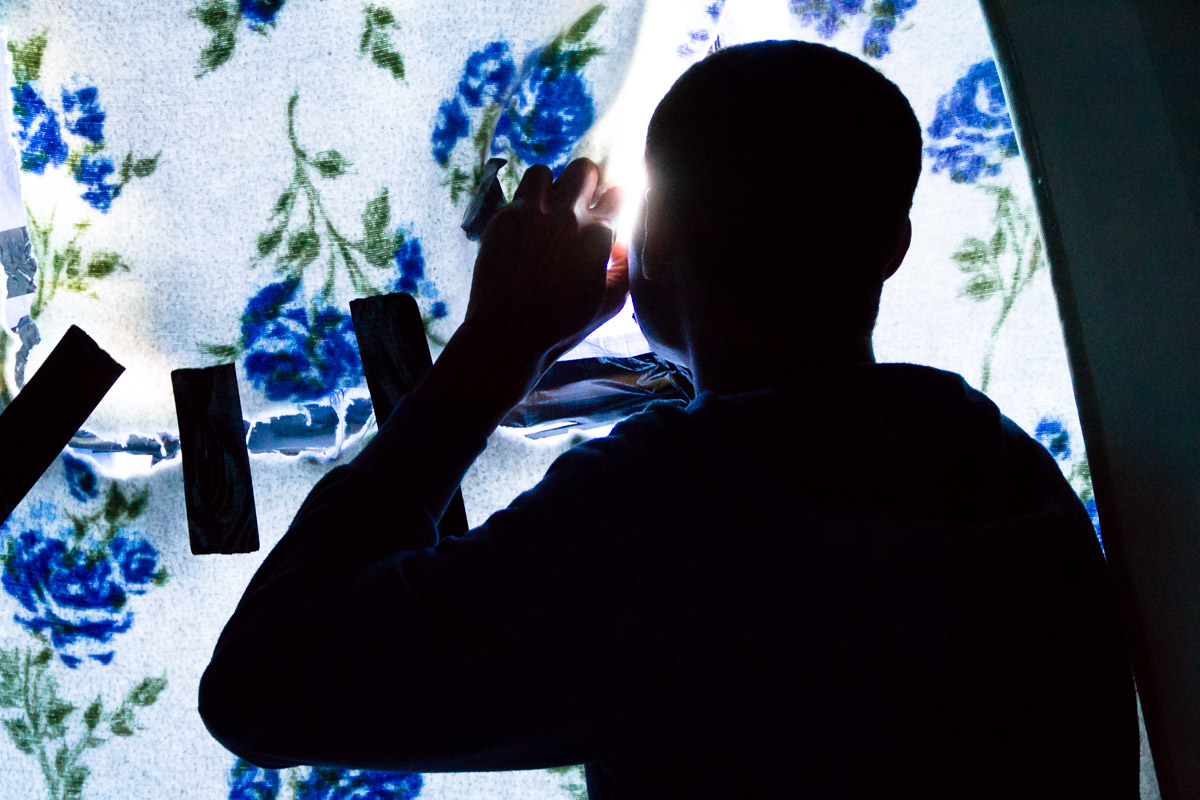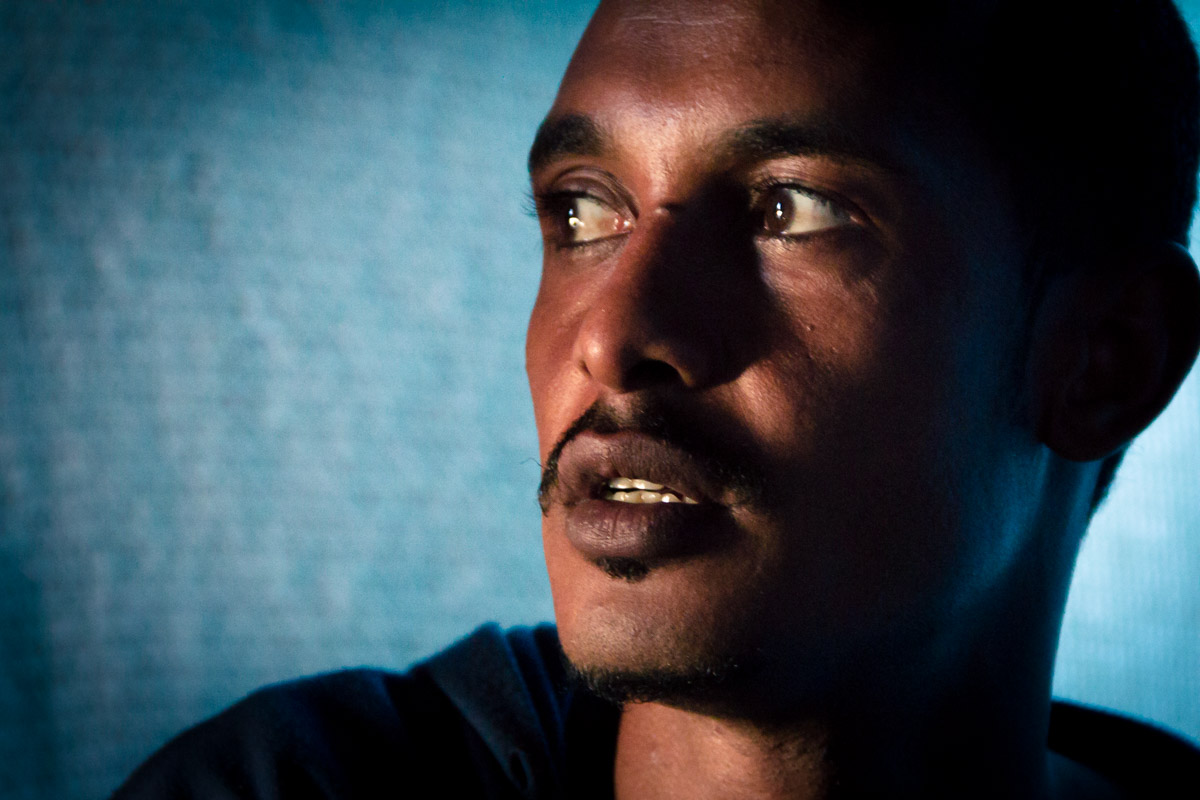A JUNGLE BUILT ON SAND

Calais (FR), Aug 2016. Coming from the sea, the first approach to Calais is quite a peculiar one. While the ferry enters the harbour, the main view transitions from that of a windy seascape to one of grey docks stretching out in muddy water from vast tarmacked areas constellated by warehouses and industrial buildings. Massive ferries and ships fill the frame, along with rows of vehicles lined-up on land waiting to be boarded. Once on mainland, driving towards the way out feels like negotiating one’s own freedom in an endless series of twists and turns, inside a maze of continuous 4 metres tall immaculate fences topped with barbed wire. These “walls” run along both sides of the road and the illusion they give is that metal grills have been laid all over the car windows. Occasionally, this pattern is enhanced by border force buildings and – most unusual – riot police pickets. Eventually, the car moves past this peculiar landscape to the a more familiar suburban scenery.
Calais is a small city located on the French side of the strait of Dover, where the latter reaches the narrowest distance between the United Kingdom and Europe. The town counts today about 80.000 citizens, and features few but characteristic spots and landmarks. Many of these are placed in the city centre, where cafés and restaurants find their place next to historical buildings and monuments. The characteristically wide beach is the other main attraction, often swept by the wind and populated in every season by bathers, strollers, and overconfident seagulls. From here the French coast can be seen stretching West as far as the eye can see, while the old harbour and the commercial port block the view to the East, characterised by the non-stop hustle and bustle of ships. On clear days the white cliffs of Dover can also be seen in the distance across the Channel – a pale and blurred line painted over the sea. Along the promenade, hotels stand tall and close to each other facing the shore, while at their feet tourists enjoy their moules soup in the traditional restaurants.

Calais is a small city located on the French side of the strait of Dover, where the latter reaches the narrowest distance between the United Kingdom and Europe. The town counts today about 80.000 citizens, and features few but characteristic spots and landmarks. Many of these are placed in the city centre, where cafés and restaurants find their place next to historical buildings and monuments. The characteristically wide beach is the other main attraction, often swept by the wind and populated in every season by bathers, strollers, and overconfident seagulls. From here the French coast can be seen stretching West as far as the eye can see, while the old harbour and the commercial port block the view to the East, characterised by the non-stop hustle and bustle of ships. On clear days the white cliffs of Dover can also be seen in the distance across the Channel – a pale and blurred line painted over the sea. Along the promenade, hotels stand tall and close to each other facing the shore, while at their feet tourists enjoy their moules soup in the traditional restaurants.
Although quite small and not particularly characteristic compared to other towns across the country, Calais is among the major touristic destination in Northern France. The large ferry terminal and the close-by Eurotunnel play a crucial role in the local tourism industry generating revenues, as well as a larger spin-off economy which comes to work alongside the fishing industry – the other main local source of income. Calais counts more than 10 million visitors annually, appearing among the first top-choice destinations for English people who look for short getaways topped by good food not too far from home. However, its peculiar geographical position and important maritime and rail links with the UK, also make of the town a crucial stop along the Migrant Route for undocumented asylum seekers directed to Britain.

Since the late 1990s this route has grown ever popular among migrants, so much so to require the opening of the Sangatte Red Cross centre in 1999 (then shut down in 2002). This event not only revealed the extent of this humanitarian crisis in Calais for the first time, but also demonstrated the crucial importance of NGOs in such circumstances. However, the lack of greater assistance from local authorities pushed migrants to organise themselves in squats, slums and several camps – so called “Jungles” – around the town, periodically evicted by police only to reappear soon after. Today, the tragic developments happening in war theatres across the Middle East, parts of Africa and Asia, have further magnified the gravity of these dynamics, as millions sought refuge in Europe therefore dramatically increasing the number of migrants reaching Calais. While the UK turns down most requests of asylum and many more turn to illegal means to try and cross the Channel, most of them become stuck in Calais for weeks or even months while waiting and trying their luck. In the meantime, as the response from French authorities is slow and inefficient in providing alternatives and proper support, refugees have no other choice but to settle in tents and makeshift shelters. During the last year this situation has exponentially spiralled out of control, especially in the area just outside Calais referred to as “Les Chemins des Dunes”. Here, the “Jungle de Calais” – or simply “Jungle” – has sprung up over an area of about 1.5 square miles characterised by a sandy landscape devoid of any basic utility, becoming today the biggest unofficial refugee camp in France and Europe.

The Jungle is not too far from Calais and during the day it is easy to meet volunteers or migrants walking to or from the camp willing to have a chat and spare some company. Following the way to the local industrial estate, the entrance to the Jungle appears at the end of a long straight just by the A16 motorway, surrounded by chemical and heavy industry plants. Similarly to what seen in the harbour, one cannot fail to notice once again the white and tall fences. Here, they run all along the motorway and around the perimeter of the industrial estate just like the protective walls of a fortress, conveying rejection and separation towards those walking at its feet. Eventually, the road ends and only the motorway flyover stands before the entrance to the Jungle, almost like a gateway separating two worlds. Shaded from the Sun and filled with echoing voices and sounds, this liminal space becomes a portal between the Calais and the Jungle – the Jungle and the rest of Europe. The walls and pillars are painted with all sort of graffiti, expressing hope and solidarity, but also frustration and disappointment towards the French and British government as well as the EU. Others are just works of art by more or less known artists, from locals to Banksy. On the other side, a CRS (Compagnies Républicaines de Sécurité) police squad stands menacing by the entrance to the Jungle in a new twisted interpretation of welcome team.

Looking from an elevated position, the Jungle appears as a low and flat patchwork of plastic and multicoloured roofs, each one a makeshift sanctuary and home. Although the French government has already carried out a series of evictions in the last few months and razed the southern part of the camp in February, the Jungle still brims with social life. Along what seems to be the main street, shops, cafés and restaurants set up by the residents of the Jungle represent some of the main focus areas for the community. Everything is ingeniously organised in self-organised spaces of various dimensions, and while shops offer every kind of goods, each restaurant and bar is peculiar and unique in the way it reflects its owners’ ethnic roots in its look and service. These spaces are quite pivotal to the life of the Jungle as they provide hot meals and electricity – essential in order to keep in touch with the outside world – as well as a chance to create bonds and establish a strong community. However, while these prove the great dynamism, resilience and spirit of self-determination of some of the Jungle’s residents, unfortunately they cannot translate into extensive and long term support.

This becomes evident when one is reminded that the Jungle hosts vulnerable minorities, single mothers, unaccompanied minors, people with physical and mental disabilities including post-traumatic stress disorders; people that had no other choice but to flee from war thorn countries. On one hand, support between residents undoubtedly implies meaningful dynamics. On the other, the size and context in which the Jungle has today evolved requires the presence of a third actor in order to support such enterprises but also to organise and redirect the vast amount of material and financial support flowing into the Jungle daily. This is where non-governmental organisations (NGOs) step in and become fundamental figures in fulfilling that role of human rights guarantors which governments and authorities have in the meantime largely neglected.
Therefore, hundreds of volunteers live and work here to relieve the harsh living conditions of thousands, with activities and projects dedicated to the most diverse needs. The list of NGOs active in the Jungle is quite long, and it includes the French associations Salam, L'Aubergue des Migrants, Utopia 56 and Secours Catholique. A number of foreign NGOs are also present, among these Help Refugees, Care4Calais, Ashram Kitchen, Belgium Kitchen, and Calais Action. All of them provide food and clothes distribution, material aid, healthcare assistance, legal and psychological support. Dedicated help is also provided for women and children by associations such as Jungle Books, the Unofficial Women's and Children's Centre and Refugee Youth Service. These organisations have been working here for months and have thus become important reference points for the residents of the Jungle. Especially for vulnerable subjects, these initiatives and their activities become real safety nets, which they come to trust and rely on after months-long journeys spent alone in constant danger for their life.

The latest census carried out in August by Help Refugees shows impressive figures. 9106 is the total number of people currently living in the Jungle, a +29% increase since the last report in July. Most of these come from Sudan and Afghanistan, and 865 of them are minors, of whom 675 unaccompanied – the youngest being only 8 years old. The incoming flow of people is constant on a daily basis, with figures reaching approximately 500 new arrivals weekly. In this case, NGOs take care of the welcome process providing first aid, and distributing tents, sleeping bags and other essentials coming from donations. Ultimately, keeping track of the camp population does not only serve a mere statistic purpose but also carries out an important safety function, especially for what concerns minors. For instance, it is thanks to these monthly reports that in February Help Refugees was able to denounce the disappearance of 129 of them, following the eviction and demolition of part of the camp by local authorities.
In fact, after this sad event many NGOs have further moved closer to refugees through projects and initiatives, trying to encourage their participation and safeguard their well-being. One of the most active on this front is “L'école laïque du chemin des dunes”, a school open to everyone regardless of religion, ethnic origin, or age. The school was founded and is currently managed by two former asylum seekers: Zimako Jones, from Nigeria; and Marko, from Kurdistan. In collaboration with the French organisation Solidarité Laique, they have setup a school in the southern part of the Jungle consisting of a large open space surrounded by three large shacks. These host two classrooms, a first-aid room, a meeting room, and a kitchen with two dorms reserved to the teachers and volunteers working here. Additionally, the school also has dedicated spaces for open-air exercise with a small gym, and various playgrounds for children.

Every day from 11A.M. to 7P.M. classes are organised by age and packed with students, whose ages span from 20 and 30 years-old to teenagers and children as young as 6. Especially for the latter, recreational activities are very important and organised in the premises of the school but also outside the Jungle in the form of trips to Calais or to the nearby beach. As Marko says, “families are happy to bring their kids here, some of them very young in fact, so they can play and enjoy themselves with their peers. Every now and then we also organize trips to the seaside, which always make the kids very happy”. He further comments that “instead, the grown-ups enjoy very much their time here at the school learning French or English, doing exercise or spending their time with the volunteers. They are good learners and often interact with their teachers during the lessons, which also proves their determination to start anew in a foreign environment”.
Beside the youths living in the Jungle, the other vulnerable part of the community is represented by women, who are sometimes travelling alone and often also carry children with them. In fact, women constitute about 10% of the camp’s population, and several centres are exclusively dedicated to their support. One of these is the Jules Ferry Centre (JFC), which was opened with the aid of the French government in 2015 – the first permanent one since the Sangatte closed. It is co-run by La Vie Active and Médecins Sans Frontières (MSF), the latter especially concentrating on healthcare and hygiene issues, as well as psychological support. Beside caring for daily meals and supplying education, the JFC also provides personal assistance and overnight accommodation for up to 500 women in the Women Centre. Here they can rest in a restricted-access, safe and quiet environment, with private kitchens, toilets and showers. However, the number of daily applications outnumbers the availability the centre is able to offer. Therefore, some NGOs have decided to specifically address women’s needs and provide additional and exclusive support.

One of the most active on this front is the Unofficial Women and Children's Centre (UWCC), a British independent organisation based in a converted double-decker bus. The project was born about one year ago when they received the bus as a donation from a small crowd-funding campaign. Then, the decision to dedicate this space exclusively to women was motivated by the need to tackle the constraints suffered daily by women, whose cultural and religious identities are often overcome by the life and dynamics of the Jungle. Flora, a volunteer from London and senior member of the Centre, explains how they rarely used to leave their tents or were able to be part of the community, often becoming target of sexual harassment and abuse. Therefore, the UWCC has since become an important reference point, a safe and protected environment for many where to relax, interact, and feel empowered. Whether through conversation or various activities, women are able to release the stress caused by a challenging journey and hardships. Even though this might be only for a few hours, it still means a lot for their physical and mental wellbeing, which eventually reflects on that of their children.
Flora says that among the various activities, the day dedicated to the personal care is the most appreciated one: “It is an extremely significant moment which boosts their spirit, preserves their personal dignity and identity”. At the same time, women can also rely on volunteers (all strictly women) to look after their babies whether they want to participate to the projects of the UWCC or they need time for themselves. In this regard, educational and recreational activities are organised in order to provide children from 3 to 9 years-old (and sometimes even younger) with a stress-free and positive learning environment. In this regard, Flora comments how “they must be closely followed because of their tender age and the experiences they went through. By doing so, we are able to do our best to provide a supportive environment. Eventually, what we want to do is just try to make them feel children".


Despite all these initiatives, life in the Jungle is still very harsh and tense for its residents, and both Marko and Flora feel worried for what is to come in such a constantly shifting environment. “For some time we’ve been hearing rumours circulating about a final and permanent eviction of the camp. In the meantime, police have intensified patrols, arrests, and the use of violence”, says Marko. Indeed, many among volunteers and refugees have highlighted how authorities are trying to establishing a hostile environment both for asylum seekers and NGOs, in order to discourage new arrivals and stays, while also disrupting and weakening the volunteering network.
One of such actions has recently targeted the small businesses and restaurants managed by asylum seekers, resulting in a major civil dispute between the owners – supported and represented by NGOs – and the local administration. The ruling came after lorry drivers and farmers demonstrated against the continuous disorders happening around the harbour, Eurotunnel and motorway area, and the threats received by migrants trying to smuggle on their vehicles or properties. However, these incidents are ultimately the result of the government’s indifference and lack of interest in the current situation, causing sense of isolation, neglect and frustration among migrants – which in turn give rise to confrontational behaviours and unrest.

Nonetheless, the Calais-Pas Du Nord council requested the closure of all activities managed by refugees, questioning the lack of health and safety standards. As expected, this decision has been met with criticism, and has been largely described as a mockery and a pretext to further enforce evictions and struck a decisive blow to the survival of the Jungle. A move aimed at scattering and relocating its residents to other hotspots across France – not much better off than the Jungle itself – in order to keep the areas surrounding the port and the Eurotunnel free of disruptions. Refugees and volunteers contested the ruling and eventually won on August the 11th. Furthermore, the appeal court recognised the social value of the businesses in the current context, highlighting the contradictory nature of the accusations on behalf of those same authorities who should ensure healthy and respectable living standards.
In a way, this decision also substantiated the government’s lack of commitment in trying to establish a presence in the camp (other than with police). Indeed, the only relevant effort other than the JFC was the opening in January 2016 of the Centre d’Accueil Provisoire (CAP – French for Temporary Reception Centre). The CAP is an area operated by French authorities where 1500 beds have been made available in 125 small housing units, as a complementary solution to the eviction plans. However, while these dwellings are obtained from converted shipping containers and are equipped with bunk beds and heating, they lack running water, sanitary facilities, and communal areas. Although many were convinced to move in, others refrained from doing so citing the bare and minimal living standards offered, not too different from those found in tents and makeshift shelters. Moreover, some also criticised the presence of fences and fingerprint activated turnstiles at entry and exit points, concerned this would turn into a semi-confinement living regime with identification records kept for each resident. While authorities have always stated that fingerprints are only taken for security reasons, asylum seekers are not willing to provide personal identification data due to the restrictions imposed by the Dublin Agreements. Indeed, these state that refugees must request asylum in the country where they first arrive and are identified, which in this case would prevent them to claim sanctuary in the UK.

In this harsh and constantly unstable social and juridical climate, NGOs eventually stand beside the residents of the Jungle looking after their safety and wellbeing, as well as acting as spokespersons for their causes and rights. However, the current local and international political climate constantly threaten to dismantle this humanitarian scaffolding. In this regard, the French House Secretary Bernard Cazeneuve has recently reiterated his determination to solve this stalemate with the final eviction of the Jungle. He pointed out how this is planned to take place "with great determination" but "gradually, while creating more housing and reception centres" where refugees will be able to find a new accommodation. Sadly, this approach once again reflects a tendency to objectify and dehumanise people rather than dealing with their situations or trying to solve the problem at the root – especially when the latter are intertwined with the devastating European colonial past. Indeed, very often such are the results of contemporary and former fallacious international and intra-European strategies, which eventually come back around in a cause-and-effect chain of events.
Certainly, the impact of the recent financial crisis and the implementation of politics of austerity have encouraged the growth of right-wing parties and fostered nationalism and anti-immigration sentiments across Europe. In this scenario, Mr. Cazeneuve’s attitude takes place in a wider frame including recent negotiations carried on by the current presidential candidate and former French head of state Nicolas Sarkozy. Well known for his conservative stands, he has recently suggested to the newly installed English Prime Minister Theresa May to transfer the Jungle across the Channel, as a response to the supposedly insufficient commitment on behalf of the UK. While the comment showed a grotesque lack of empathy in the first place, it was similarly bounced back from the other shore in a mere diplomatic-like blame game.


NGOs cannot but take a stance from their grassroots and daily basis experience. “Asking for the dismantling of the camp today would bring to a worsening of the situation instead of solving problems”, comments François Guennoc of Auberge des Migrants. In an effort to prevent this from happening, NGOs directly addressed the French government in an open letter. They warn that an eviction of the camp would only scatter migrants over an even wider area, worsening their living conditions and eventually causing more disruptions than those already lamented by lorry drivers and locals.
In the meantime, the only solution that British-French diplomacy seems to have been able to find is the building of a 4 meters tall wall to further isolate the Jungle from civilisation. Local authorities say its construction is expected to be completed by the end of the year. "Not a new initiative" states British Home Secretary Amber Rudd, but “the right amount of security to prevent ‘illegals’ trying to reach the UK”. In the meantime, the population of the Jungle is expanding day by day and growing anxious over their future. Similarly, the citizens and business-owners of Calais are becoming increasingly concerned over the price the town will eventually pay, as they see tourism shrinking and politics creating divides and fostering discrimination. As Marine Le Pen and her National Front keep gaining consent, now more than ever the Jungle finds its roots set in shifting and unsteady sand.

